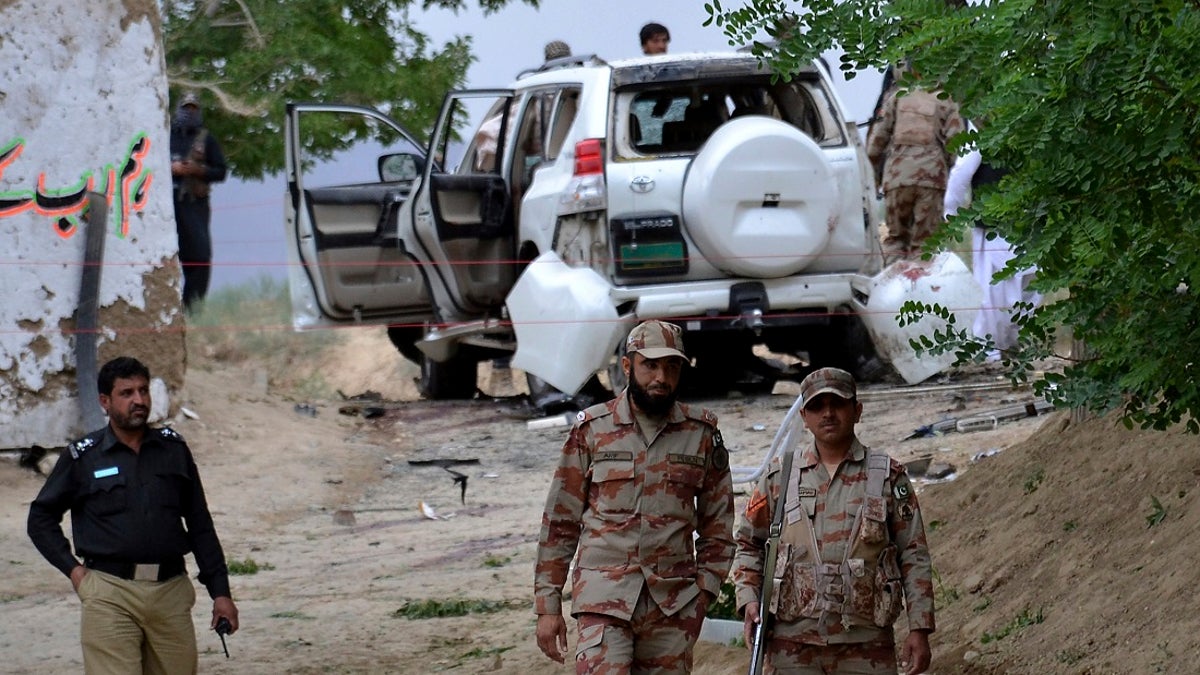
Pakistani security officials stand guard at the site of a suicide bombing which killed dozens of people and left many injured in Mastung district near Quetta, Pakistan, Friday, May 12, 2017. (AP Photo/Arshad Butt) (Copyright 2017 The Associated Press. All rights reserved.)
During his high profile trip to the Middle East and Europe, President Trump met with Pakistani Prime Minister Nawaz Sharif in Riyadh. This meeting may have been overshadowed by the pomp and circumstance of the president’s first foreign trip, but the timing of the meeting between these leaders was critical, as a decision on U.S. forces in Afghanistan looms on the President’s agenda.
Then on Wednesday, only days after the meeting, at least 90 people were killed in a rush hour blast in Kabul – and Afghanistan is accusing the Pakistanis of assisting the Haqqani terror network in the attack.
This and the myriad of other national security challenges in the region – including the Taliban’s heightened insurgency in Afghanistan – all point to a need for the new administration to focus on its nascent relationship with Pakistan, a country that is fickle and filled with political landmines. Establishing a relationship and setting boundaries with Sharif may be one of President Trump’s greatest foreign policy challenges. Navigating all of this requires nothing short of the "Art of the Deal."
For Pakistan, a welcome opening move would be to release Dr. Afridi, the Pakistani doctor who played such an important role in the operation to target Usama Bin Laden.
Breaking our relationship with Pakistan is not an option. Given the years of vacillation between Pakistan and the U.S., many in Washington have argued a heavy hand is needed with Sharif, or have advocated cutting off the relationship entirely. However, it is vital that the U.S. continue its engagement with Pakistan, but it must do so based first on common ground. For Pakistan, a welcome opening move would be to release Dr. Shakil Afridi, the Pakistani doctor who played such an important role in the operation to target Usama Bin Laden. Bin Laden enjoyed refuge in Pakistan for many years, and Pakistan should consider the benefit of closing this chapter by freeing Dr. Afridi.
At the end of the Obama administration, Pakistan didn’t believe that the U.S. was committed to seeing a stabilized Afghanistan. Pakistan would argue that their double dealing regarding support for terrorist groups is a “strategic reserve” in case Afghanistan should collapse, or move too close to India. (Not an acceptable excuse, by any means, but nevertheless what they believe.)
The Pakistanis want to be on equal footing with other players in the region, and we cannot oversell the paranoia they have regarding Indian influence in the region. Many sophisticated foreign policy hands struggle with the immense contradictions in the U.S.-Pakistan relationship, and President Trump’s fresh perspective may do well in this complicated dance.
Given the many places in which we diverge, the U.S. and Pakistan should work on areas in which we find commonality, like targeting Al Qaeda and its affiliates and working to stabilize Afghanistan. Pakistani military and intelligence, and their U.S. counterparts, have been highly effective partners against AQ targets. In Afghanistan, the President is currently weighing options and by all indications it appears that he is looking to increase the scope of American involvement.
Since our reduction in forces in 2014, we have seen a resurgence of the Taliban and the development of ISIS. There will never be any chance of resolving the Afghan insurgency and defeating ISIS and the AQ affiliates without Pakistan's cooperation.
A glaring area where our interests diverge is on the Haqqani network (HQN), where Pakistan’s military continues to support this prominent and incredibly lethal group. This is where the Trump Administration should push the Pakistanis. HQN has mounted high profile attacks against the government of Afghanistan and its coalition, which includes U.S. partners. Taking advantage of the safe haven in Pakistan has enabled HQN’s attacks in Afghanistan, where the U.S. has spilled much blood and treasure. The Pakistanis must know that their support to the HQN will never be acceptable.
The Trump Administration would do well to open and deepen the lines of communication with senior Pakistani leaders, which will later enable a smoother pivot to resolving the challenging issues on which we diverge. From an intelligence and operational perspective, America simply is unable to take on these intricate counterterrorism operations in Southeast Asia on our own.
In the spirit of this realpolitik partnership, it would also benefit both sides if the U.S. were to note Pakistan's sacrifices, including the exceedingly high number of terrorist attacks in the country, as well as its own economic challenges and counterinsurgency operations.
Former Secretary of State Condoleezza Rice used to say the U.S. - Pakistan relationship was like a "critically ill patient" which needed to be kept alive for the next day. With a new administration brings the opportunity to find areas of mutual agreement for both countries. The national security of both Pakistan and the U.S. will most certainly hinge upon it.








































